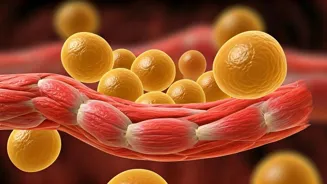Constant Fatigue Lingering
Persistent tiredness is a significant indicator that could signal either fat burning or muscle loss. When your body burns fat, the process can sometimes
feel slow, potentially leading to fatigue. This isn't just about feeling tired after a tough workout; it's about feeling drained even after adequate rest. If you consistently find yourself low on energy, it's crucial to assess your diet and exercise routine. Ensure you're consuming enough calories and protein to support your muscle mass. Moreover, intense workouts without sufficient recovery time can exacerbate fatigue, potentially leading to muscle breakdown. Rest and proper nutrition are your allies in this scenario. Prioritize getting enough sleep, roughly 7-9 hours per night, to allow your body to recuperate and prevent muscle loss. If fatigue persists, consider consulting with a healthcare professional to investigate underlying health issues or nutrient deficiencies. This vigilance will help you make informed decisions and keep your fitness goals on track.
Strength Levels Dropping
A noticeable decline in strength levels is a major red flag indicating possible muscle loss. When you're burning fat and preserving muscle, you should generally maintain or even slightly improve your strength over time, especially if you're incorporating strength training into your routine. If you find that your previous weights feel heavier, or you're unable to perform the same number of repetitions, it could signify muscle atrophy. This could be attributed to several factors, including inadequate protein intake, insufficient calorie consumption, or overtraining. Prioritizing adequate protein in your diet is essential, aiming for roughly 0.8 to 1 gram of protein per pound of body weight. Ensure you're consuming enough calories to support your workout demands. Moreover, listen to your body and take rest days when needed. Overdoing your workouts without proper recovery can lead to muscle breakdown. Adjust your workout plan as required and focus on exercises that help stimulate muscle growth. If your strength continues to decline, it's essential to review your diet and training regimen, potentially seeking guidance from a fitness professional.
Muscle Soreness Changes
Altered muscle soreness patterns can provide valuable insight into whether your fitness efforts are resulting in fat loss or muscle breakdown. Typically, when you're effectively burning fat while retaining muscle mass, your post-workout soreness should be manageable. Your muscles might feel sore the day after a tough workout, but this soreness should gradually diminish as your body adapts. If you're losing muscle, however, you may notice several changes. Excessive soreness that lasts for days may suggest inadequate recovery and potential muscle damage. Conversely, a rapid decrease in soreness without any change to your workout could mean muscle loss, especially if it's coupled with decreased strength or decreased performance. Ensure you're providing your body with sufficient rest and nutrition to facilitate muscle recovery and prevent muscle breakdown. Prioritize adequate sleep, proper hydration, and a diet rich in protein and carbohydrates. Incorporating active recovery methods, such as light cardio or stretching, can also help minimize soreness. If you’re experiencing these changes in soreness without significant improvements, examine your training and diet for any potential issues.
Appetite Changes Observed
Significant shifts in your appetite can offer clues regarding your body's fat-burning or muscle-losing state. When your body is successfully burning fat, your appetite might remain relatively stable. You might experience an increased sense of fullness due to the metabolic processes. In contrast, a diminished appetite can indicate insufficient calorie intake, which might lead to muscle loss. Conversely, an unusually strong and insatiable appetite might indicate a metabolic issue, perhaps triggered by overtraining or hormonal imbalances, potentially also resulting in muscle breakdown. Monitor your food consumption closely. Make sure you're eating enough calories, with a healthy amount of protein, to provide your body with what it needs for repair. Consider consulting a nutritionist or registered dietitian to fine-tune your dietary needs and ensure they meet your body's specific requirements, which vary depending on your workout intensity and overall health.
Mood Swings and Irritability
Unexplained mood swings or increased irritability can indicate issues beyond mere fluctuations in your fitness journey. When your body successfully sheds fat and maintains muscle, your mood usually remains steady. The hormonal balance is typically maintained, providing a sense of well-being. If you’re experiencing frequent mood fluctuations, such as increased anxiety or irritability, consider this a warning sign. This could indicate a number of things, including an overtrained state, in which cortisol, the stress hormone, rises, potentially causing muscle catabolism. It could also be a symptom of insufficient calorie consumption or an imbalance of nutrients. Prioritize adequate rest and stress management techniques, such as meditation or yoga, to help balance your hormones. Evaluate your workout intensity. Ensure you're getting enough sleep and consuming a balanced diet with adequate calories and nutrients. If you observe sustained mood alterations, consider getting medical advice to rule out other potential contributing factors.
Reduced Exercise Performance
A noticeable decline in your exercise performance can signal potential muscle loss, which should be a cause for concern. When you're effectively burning fat while preserving muscle, your exercise performance should either improve or stay consistent. If you find that you're struggling with your usual workouts, this could be a sign of an issue. This could be due to inadequate recovery, poor nutrition, or overtraining, which can all contribute to muscle deterioration. Observe how your body responds to your workouts and rest periods. Examine your diet to make sure you're consuming enough protein and calories to fuel your workouts. Try to incorporate a variety of exercises, so that your body does not stagnate. Ensure you're taking appropriate rest days to allow your muscles to recover and rebuild. If your exercise performance continues to decline despite these adjustments, you might be experiencing muscle loss and should evaluate your training and nutrition strategy, possibly seeking guidance from a fitness professional.
Increased Injury Frequency
An increase in the frequency of injuries can be a significant indicator of muscle loss, as your body’s support structure may be compromised. When burning fat and preserving muscle, your body should typically become more resilient and your injury risk should decrease. However, if you find yourself experiencing more aches, pains, or strains, or if injuries take longer to heal, this may suggest muscle breakdown. This could be due to an imbalance in your training regime, inadequate rest, or improper nutrition. Muscle loss can weaken joints and increase the risk of injuries. Prioritize proper warm-up and cool-down routines before and after exercise. Make sure you're getting enough rest between workouts, about 7-9 hours of sleep per night, and eating a well-balanced diet with adequate protein and nutrients to support muscle recovery and repair. If you experience increased injury frequency, it's crucial to re-evaluate your training plan and seek advice from a fitness professional.
Changes in Body Composition
Observable changes in your body composition are vital in determining whether you are burning fat or losing muscle. When your body effectively burns fat and retains muscle, you will observe positive changes. This includes a reduction in body fat percentage along with a potential for increased muscle mass. You may notice that your clothes fit better, and your overall physique may appear more toned. Muscle loss, however, can manifest differently. You might observe a decrease in muscle definition and a softening of your body's appearance. You might also find that your body fat percentage increases, even if your weight remains constant. Utilizing tools like body fat scales, taking progress photos, or getting professional body composition analyses can help you track these changes. Focus on maintaining a balanced diet with sufficient protein, adequate calories, and a varied workout routine that includes both strength training and cardio. Regularly evaluate your progress, and make adjustments to your diet and training as required to ensure you stay on track and meet your fitness goals.
Frequent Illness or Weakness
An increase in the frequency of illnesses or a general feeling of weakness is a clear indicator that could suggest either inefficient fat burning or muscle loss. If your body is in a healthy state of fat loss, your immune system should function well, thus helping you to ward off illnesses. However, if you're frequently getting sick, experiencing fatigue, or have a general feeling of being run down, your immune system may be compromised. Muscle plays a critical role in supporting your immune system, and its loss can weaken your defenses. This could be a symptom of an underlying problem, such as inadequate sleep, stress, poor nutrition, or overtraining. Prioritize sufficient sleep (about 7-9 hours per night), manage your stress levels through techniques such as meditation, and ensure you're eating a balanced diet with enough vitamins and minerals. If your symptoms persist or worsen, consider consulting a healthcare professional to investigate the underlying causes.
Difficulty in Losing Weight
If you're struggling to lose weight, or if the weight loss has plateaued, it's important to examine whether you are burning fat or losing muscle. Ideally, when you’re effectively burning fat, your weight should gradually decrease as your body sheds excess fat. If, however, you are experiencing difficulty in losing weight or if your weight loss has plateaued, it could mean that you are losing muscle mass. When you lose muscle, it affects your metabolism. Muscle is metabolically active, so a decrease in muscle mass can lower your resting metabolism, making it harder to burn calories. Review your calorie intake, exercise routine, and overall lifestyle. Ensure that you're consuming an appropriate number of calories. In addition, make sure that your workouts are effective at stimulating muscle growth. Evaluate your overall health and consider consulting a healthcare professional to address any potential underlying issues.




















